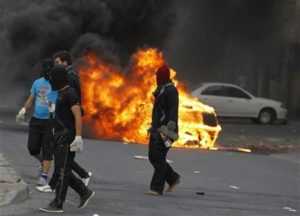The Government of Bahrain and opposition movement are at a stalemate. Last November, the Bahrain Independent Commission of Inquiry (BICI), comprising of individuals selected for their human rights expertise released a damning report outlining the many abuses committed by Bahrain’s government during the February 2011 crisis. While the government has made progress in implementing the report’s recommendations, some aspects have yet to be addressed. While the government claims that change will not happen overnight (it has only been a five months since the rep ort’s release) time is a resource that Bahrain’s government should not waste.
ort’s release) time is a resource that Bahrain’s government should not waste.
Last month the government-appointed National Commission, charged with carrying out the BICI recommendations praised the government for its reforms. According to Ali Saleh al-Saleh, the Commission’s chairman, nearly two-dozen of the report’s recommendations have been implemented, including retrials, the re-institution of those fired from their jobs and expelled from university and the creation of institutions and positions to ensure that human rights are respected. Al-Wefaq, Bahrain’s main opposition group claims that only ten percent of the mandated reforms have been instituted. Furthermore, al-Wefaq complains that political reforms are being ignored and human rights abuses continue. Al-Wefaq’s ultimate objective is the increase of Shiite representation in government.
This is a concession Bahrain’s government is not likely to make. Deep sectarian tensions between Bahrain’s Shiite and Sunni communities have divided the country. The Sunni-led government is deeply suspicious of the Shiite community, alleging that many are allied Iran. Such suspicions are not unjustified. Since Bahrain gained its independence from the United Kingdom in 1971, Tehran has repeatedly instigated unrest.
As such, al-Wefaq’s demands are unlikely to be met anytime soon. Bahrain’s government is divided between reformers such as Crown Prince Salman bin Hamad bin Isa al-Khalifa and the old guard, including Prime Minster Khalifa bin Salman al-Khalifa. Internal friction has prevented significant progress as the two factions disagree on how to manage the opposition.
As the government determines its course of action, the opposition, not without its own questionable objectives, continues wage violence on the streets. Though the opposition claims that those taking part in the violence are a small faction (14 February Youth Movement), their actions have nevertheless changed the character of the opposition. Police have responded, using tear gas and rubber bullets and according to some, through unprovoked violence and arbitrary arrests.
The United States, a long-standing ally of Bahrain (the U.S. Navy’s Fifth Fleet is based in Manama), has urged Bahrain’s government to show restraint and implement forms. The Obama administration even suspended a $53 million arms deal to show its objection to what it perceived as the Government of Bahrain’s abuse against protesters. However, the administration did permit a rather insignificant $1 million military supply sale to be exchanged. The blocking of the arms deal was a petty way of managing the situation as it sends the wrong message to America’s enemies in the region and downplays Bahrain’s strategic importance. Bahrain is a major partner in safeguarding international access to the Persian/Arabian Gulf, containing Iran and safeguarding oil flows through the Straits of Hormuz.
The Government of Bahrain does not have any time to waste in implementing reforms or reunifying the country. The latter will take years whereas the BICI reforms can and should be made expeditiously. However, for this to work King Hamad Ibin Isa al-Khalifa should take extra care in ensuring the human rights reforms that have been implemented are respected by those within the government. Restraint and professional conduct by security forces is a first step in showing the opposition movement that it is acting in good faith, but these measures will mean nothing if they are ignored.